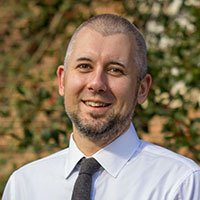From awareness to action: The Gillings School takes on stroke
May 22, 2019
Each May — National Stroke Awareness Month — people in the United States become acutely aware of the enormous challenge that strokes pose for individual well-being and public health. In this country, where nearly 800,000 people suffer a stroke each year, stroke is the fifth leading cause of death and a major cause of serious disability. Globally, more than six million people die of stroke per year.
At the UNC Gillings School of Global Public Health, researchers and students confront the challenge of stroke year-round in multi-faceted efforts to understand the causes and risk factors for stroke, how to prevent them, and how to improve acute care and rehabilitation for those who suffer a stroke.
“The Gillings School is actively advancing research, policy and practice to reduce stroke burden,” said Barbara K. Rimer, DrPH, dean and Alumni Distinguished Professor at the Gillings School. “By working across disciplines and taking a holistic view of the challenge, our work is helping to close gaps in both fundamental knowledge and patient care.”
Getting to the root of the problem in the “Stroke Belt”

Dr. Robert Agans
Gillings School researchers are participating in a new study to understand why people in the U.S. South live shorter and less healthy lives than their counterparts elsewhere in the country. The region, parts of which have been called the “Stroke Belt” of the United States, sees a high burden of heart, lung, blood and sleep (HLBS) disorders, particularly in rural areas of Appalachia and the Mississippi Delta.
To support the study, known as the Risk Underlying Rural Areas Longitudinal Study (RURAL), UNC biostatisticians will design a method for sampling 4,000 participants who represent multiple ethnic groups. Involving more than 50 researchers from 16 institutions, the study will collect detailed data on familial, lifestyle, behavioral and medical factors in hopes of getting a handle on the drivers of disease — and resilience — among rural residents in the South.
“We aim to understand the health ‘penalty’ experienced by people living in rural areas in this region,” said Robert Agans, PhD, associate professor of biostatistics at the Gillings School. “Our hypothesis is that individual differences arise from a complex interaction of exposures that span many domains, including adverse environmental factors and exposures, psychosocial factors, and behavioral and lifestyle choices. Genes, poverty, gender and minority status may exacerbate the influence of these factors on HLBS risk, whereas individual and group-level resilience factors may buffer it.”
Delivering the benefits of the Mediterranean diet, with a Southern flair
To reduce the risk of stroke, diabetes and chronic diseases across the Southeastern U.S., the Med-South Lifestyle Program translates a Mediterranean-style dietary pattern for a Southeastern population, along with interventions to boost physical activity levels.
After an initial phase focused on developing and pilot-testing a suite of interventions, the UNC Center for Health Promotion and Disease Prevention will investigate how to scale up the program and better reach racial and ethnic minorities and rural and medically underserved populations. A recent five-year, $3.75 million grant from the Centers for Disease Control and Prevention (CDC) will fund the research to scale the Med-South program and support the Center’s infrastructure.

Dr. Carmen Samuel-Hodge
“Only a minority of evidence-based interventions are ever implemented on a broad scale, and research about how to scale up interventions is limited, especially with the populations we are targeting,” said Carmen Samuel-Hodge, PhD, Gillings School professor of nutrition and co-principal investigator for the project. “This five-year study provides us with the opportunity to test different scale-up formats and implementation strategies in local health departments and community health centers.”
In addition to funding research to expand Med-South, the grant continues the status of UNC’s Center for Health Promotion and Disease Prevention as a CDC Prevention Research Center, one of only two in the country that have been funded continuously since 1986.
“This partnership with the CDC is key to enhancing North Carolina’s public health infrastructure,” N.C. Congressman David Price said of the program. “This work will help maintain and expand critical programs that combat the rise of major health concerns across our state.”
Easing the transition from hospital to home after a stroke
While health organizations recognize the importance of transitional care — which bridges acute care and a patient’s return home — there is no standard transitional care for stroke patients in the U.S. As a result, many people who experience a stroke return home from the hospital with an inadequate understanding of how to manage their recovery, handle any residual disability and reduce their risk of future problems.
To fill this gap, the COMPASS study evaluated a transitional care program involving nearly 10,000 patients in 40 North Carolina hospitals. In the program, patients got a personalized care plan, several follow-up phone calls and a face-to-face visit, plus connections with community resources.

Dr. Wayne Rosamond
Compared to patients at hospitals without the program, patients discharged from the intervention hospitals were significantly more likely to monitor their blood pressure at home as recommended. However, the researchers also found that the intervention was not consistently incorporated into systems of care, underscoring the complex challenges of creating interventions that are not only effective but feasible for real-world implementation.
“We have seen tremendous gains in the quality of acute care for stroke over the decades,” said Wayne Rosamond, PhD, professor of epidemiology at the Gillings School. “Post-acute transitional care should be the next frontier for quality improvement for stroke systems of care.”
UNC Gillings researchers see the effort as an initial step in a long-term evolution toward more consistent transitional care across a wide range of health care environments.
“Not all health care systems are prepared to modify their systems to accommodate comprehensive post-acute management in the current health care environment,” said Rosamond. “Future research must identify facilitators and barriers to the implementation of transitional care as well as determine strategies for enhanced patient engagement.”
A focus on caregivers
Up to four in 10 stroke survivors suffer problems with speaking or understanding speech. Patients who are unable to communicate on their own often depend on a loved one or caregiver for help navigating everyday life and interacting with health care providers.

Dr. Paul Shafer
In focus groups with stroke patients and caregivers, Gillings School researchers investigated how caregivers view and adapt to their role. They found that caregivers often act as advocates, therapists, motivators and guardians. In these roles, they often are invaluable to the patient’s rehabilitation journey, though the patient-caregiver relationship also can raise important considerations around patient autonomy and caregiver well-being. Researchers say the findings point to a need for multiple stakeholders, including those in the health care community, to better support the needs of caregivers in post-stroke care.
“We wanted to learn more about how families adapt and what other specific challenges they face when patients aren’t able to communicate or effectively advocate on their own behalf,” said Paul Shafer, PhD, a recent doctoral graduate of the Department of Health Policy and Management. “We hope this work is a first step toward educating post-acute care providers that people who are thrust into a new role as caregiver for someone with communication difficulties need lots of different types of support and information, which can help improve quality of life for both the recovering patient and the caregiver.”
A personal journey inspires action and hope

Michelle Ballasiotes
For UNC senior Michelle Ballasiotes, stroke is personal. Having suffered a stroke before birth, she has had a lot of time to think about what pediatric stroke patients and their families go through and how that experience can be improved. Even before coming to the Gillings School to study health policy and management, Ballasiotes spent years translating her insights into concrete actions that raise money for research, offer encouragement to patients and improve health care providers’ awareness of pediatric stroke symptoms.
Contact the Gillings School of Global Public Health communications team at sphcomm@listserv.unc.edu.
